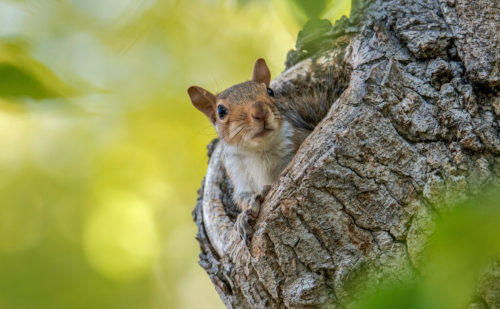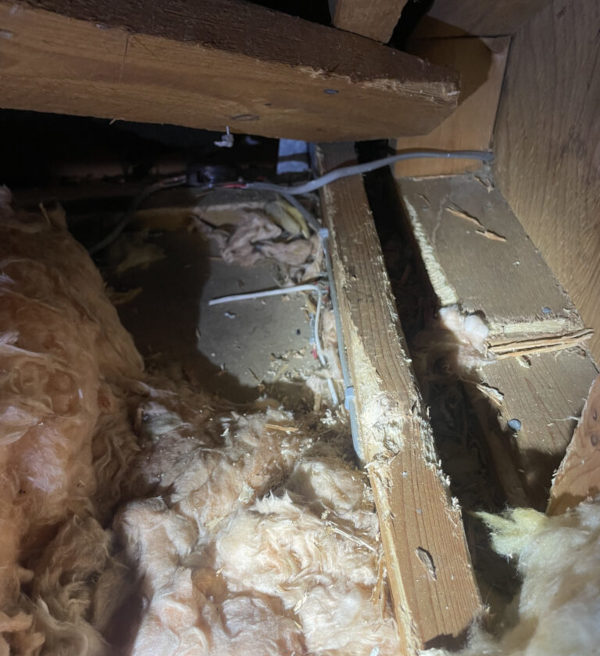Commuters on the Purfleet line in Essex were treated to an unusual sight earlier this year. A grey squirrel hopped aboard the train at (appropriately enough) Grays and settled on a seat, leaving the train at the next stop. Which demonstrates that they are inquisitive, intelligent and not afraid to invade human territory. They are strong and agile enough to overcome any barrier to reach food, safety or just somewhere they are curious to see.
None of that helps you if you don’t want squirrels in your loft. Trust me, you do not want squirrels in your loft. But they have the dexterity and intelligence to get themselves there, and once in they can cause an immense amount of damage. Squirrels are rodents, and the definition of a rodent is a mammal whose teeth grow constantly – so a rodent will chew continually. Even tough materials such as metal and stone won’t deter it. Far from it. They’ll appreciate the chance to wear some length off their teeth.

Is there a squirrel in my loft?
The first sign of squirrels in the loft will probably be the noise – running or scratching and (if they brought their favourite acorns with them) rolling. They are hyperactive animals and can run fast and continually for hours at a time without tiring. They are most active in the hours before dawn and in the evening, disturbing sleep for those in the bedrooms beneath them and possibly scaring children.
The scurrying sounds may stop when you go up into the loft to investigate, but you will find other signs to confirm that they are there. There may be a strong smell of urine and there will certainly be droppings; rat and mouse droppings are small and pointed, squirrel droppings are larger and rounded. Both pests are bad news, and each has a distinctive specialism in the kind of damage they do.
Squirrel damage
- That insulation you paid to have put in your loft? Ideal nesting material. A squirrel will tear it apart and line the nest with the shreds.
- Then they will have their kits to put in that nest, and a nest full of squirrel kits produces a large amount of squirrel poo and pee.
- Within seven weeks, the kits will be large enough to start their own running races in your loft.
- Meanwhile, the parent squirrels are contaminating the remaining insulation with their urine, droppings, fleas and mites and they are chewing the wood of the rafters and stripping the insulation from electrical cables.
- All that is bad enough, but if a rodent causes serious damage to your house – bites through an electrical cable and starts a fire, for example – your insurance company is extremely unlikely to pay out.
HOW TO MAKE A SQUIRREL-FREE LOFT
Now that I have you listening for those tell-tale scurrying sounds, it’s time to give you some good advice on how not to have squirrels as penthouse tenants.
Keep them out
First of all, stop them from getting in in the first place.
- Cut back any tree branches that are close enough to the house for them to spring across from tree to house. Be aware that they can leap a long way for such a small animal.
- Don’t let creeping plants like ivy grow a nice thick ladder for them; cut it back.
- Check for dislodged roof tiles, damaged fascia boards and gaps in the walls. They are capable of chewing an entry hole, but if you stop up the existing gaps you will make them start from scratch – and that will give you a little extra time to repair the holes before they gain entry.
- Fix steel mesh or steel plates over any entry holes you find, but fix them securely. Squirrels are strong for their size and can pull out any loosely wedged obstruction.

Get them out
Trying to remove squirrels yourself is hard work and potentially dangerous. It’s rare for a squirrel to bite a human, but their bites can be deep and carry the risk of infection. If you are bitten, wash the bitten area thoroughly, apply antiseptic (even if the skin wasn’t pierced) and seek medical advice if you feel unwell. Be wary if you try to deal with the squirrel yourself.
The Legal Aspect
One important fact to understand before you decide whether to fight the squirrels yourself. The only squirrel species in the wild in East Anglia are grey squirrels, Sciurus carolinensis, and they are not native to Britain. They carry a virus that is deadly to the native red squirrel, threatening the survival of the species. Under the Wildlife and Countryside Act 1981 and the Invasive Alien Species Order 2019 it is an offence to release a live grey squirrel into the wild, even if it was wild before you caught it. Any of the ways you can think of to kill the squirrel are likely to cause suffering, which is upsetting to you and your family and may leave you liable to prosecution for cruelty under the Wild Mammals (Protection) Act 1996.
For a humane and effective solution call the professionals. Eastern Counties Pest Control can evict your loft-dwelling squirrels legally and quickly.

